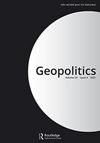超越民族国家的民族性?阿卜杜拉Öcalan和奥托·鲍尔对自治的追求
IF 3
1区 社会学
Q1 GEOGRAPHY
引用次数: 0
摘要
摘要在当今全球化时代,民族国家模式的局限性日益明显。这种模式往往要求同质化,导致少数民族的身份冲突和分离主义要求。然而,民族和文化身份仍然具有政治相关性,使得后民族野心难以实现。为了解决这个问题,我们比较了奥托·鲍尔和阿卜杜拉Öcalan的思想,他们都强调克服民族国家的限制,而不忽视民族和文化认同。Öcalan的思想优先考虑自治和多样性,而鲍尔的贡献是基于民族认同的非领土化概念。正如我们在本文中讨论的那样,两位作者分享了学术界尚未充分研究的有趣的趋同点。更重要的是,这种比较为理解跨国社会和身份冲突的当代挑战和解决方案提供了有价值的见解。披露声明作者未报告潜在的利益冲突。罗贾瓦在库尔德方言Kurmanji中的意思是西部和日落,指的是叙利亚东北部的西库尔德斯坦。2011年叙利亚内战爆发后,库尔德人根据民主邦联原则建立了叙利亚东北部自治政府。这项调查只包括受访者所属民族国家的国籍,因此排除了对少数民族的自豪感,这可能会进一步推高价值。在土耳其语原文中,用来表示“宗教团体”的词是dinî cemaatin,字面意思是“宗教集会”。尽管如此,我们选择保留“国际倡议- Öcalan自由”的官方英文翻译,尽管过度使用“社区”一词可能会误导所有类型的人类群体。我们认为,译者的目的是强调社区的作用,与民族国家相比,社区是一种更自下而上的聚集和归属感的形式。直到1991年,库尔德人在官方统计中被称为“山地土耳其人”(Sagnic Citation2010)。本研究未获得任何资金。本文章由计算机程序翻译,如有差异,请以英文原文为准。
Nationality Beyond the Nation-State? The Search for Autonomy in Abdullah Öcalan and Otto Bauer
ABSTRACTIn today’s globalised era, the limitations of the nation-state model are increasingly apparent. This model often demands homogeneity, leading to identity conflicts and separatist demands by national minorities. However, national and cultural identities remain politically relevant, making post-national ambitions difficult to achieve. To address this problem, we compare the thoughts of Otto Bauer and Abdullah Öcalan, who both emphasise overcoming the limits of the nation-state without dismissing national and cultural identities. Öcalan’s ideas prioritise autonomy and multiplicity, while Bauer’s contribution is based on a deterritorialised notion of national identity. As we argue in this article, the two authors share interesting points of convergence that have been understudied in academia. What is more, this comparison provides valuable insights for understanding contemporary challenges and solutions to multinational societies and identity conflicts. Disclosure statementNo potential conflict of interest was reported by the authors.Notes1. Rojava means west and sunset in Kurmanji, a Kurdish dialect, and refers to the Western Kurdistan, in North-East of Syria. As a consequence of the civil war, which erupted in 2011 in the Arab country, the Kurds established the Autonomous Administration of North-East Syria, based on the principles of democratic confederalism.2. The survey included only the nationality of the respondent’s nation-state, thus excluding pride in minority nationalities, which would likely have pushed the value further up.3. In the original Turkish text, the words used to express ‘religious community’ are dinî cemaatin, literally meaning ‘religious congregation’. Nonetheless, we opted for keeping the official English translation made by the ‘International Initiative – Freedom for Öcalan’, despite an overuse of the term ‘community’ for all types of human groups may be misleading. We retain that the translators aimed at emphasising the role of community as a more bottom-up form of gathering and sense of belonging compared to the nation-state.4. Until 1991, Kurds were reported in official statistics as ‘mountain Turks’ (Sagnic Citation2010).Additional informationFundingThis research received no funds.
求助全文
通过发布文献求助,成功后即可免费获取论文全文。
去求助
来源期刊

Geopolitics
Multiple-
CiteScore
7.60
自引率
10.30%
发文量
50
期刊介绍:
The study of geopolitics has undergone a major renaissance during the past decade. Addressing a gap in the published periodical literature, this journal seeks to explore the theoretical implications of contemporary geopolitics and geopolitical change with particular reference to territorial problems and issues of state sovereignty . Multidisciplinary in its scope, Geopolitics includes all aspects of the social sciences with particular emphasis on political geography, international relations, the territorial aspects of political science and international law. The journal seeks to maintain a healthy balance between systemic and regional analysis.
 求助内容:
求助内容: 应助结果提醒方式:
应助结果提醒方式:


